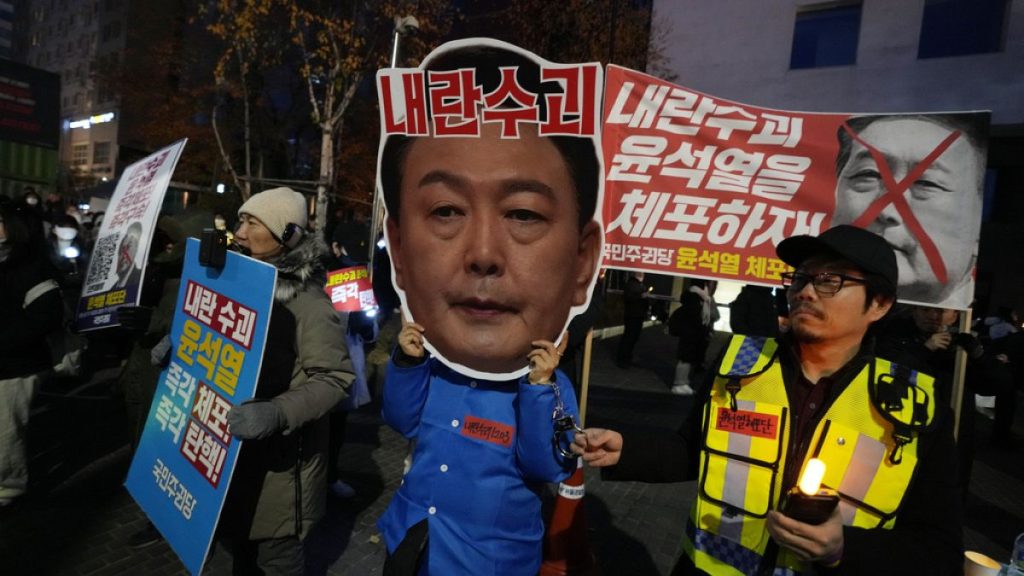The political landscape of South Korea is embroiled in a deepening crisis, centered around the embattled presidency of Yoon Suk-yeol. Opposition leader Lee Jae-myung, spearheading the charge against Yoon, has vowed to initiate a second impeachment vote, slated for December 14th. This renewed effort follows a failed first attempt, thwarted by a strategic boycott by Yoon’s ruling People Power Party (PPP). While Yoon technically survived the initial impeachment motion, his position remains precarious, with public discontent simmering and the opposition determined to oust him from office. Lee Jae-myung has made it unequivocally clear that Yoon must either resign immediately or face the renewed impeachment proceedings. This unwavering stance dismisses any notion of a negotiated exit, as suggested by the ruling party, which proposed devising an “orderly plan” for Yoon’s early departure.
The core of the controversy stems from Yoon’s recent declaration of martial law and the deployment of heavily armed soldiers onto the streets of Seoul. This drastic measure, reminiscent of South Korea’s dark past under military dictatorships, has ignited widespread public outrage and fueled accusations of authoritarian overreach. The opposition views this action as a blatant disregard for democratic processes and a dangerous precedent for future executive power grabs. The sight of military personnel on the streets has evoked painful memories for many South Koreans, particularly those who lived through the Gwangju Uprising in 1980, where martial law enforcement resulted in a brutal massacre. This historical context amplifies the public’s anxiety and fuels the demand for Yoon’s resignation or removal.
The failed impeachment vote, while technically a victory for Yoon, has paradoxically intensified the political turmoil. The PPP’s boycott tactic, while effective in preventing the required two-thirds majority, has been interpreted by many as a maneuver to shield the president from accountability rather than a genuine expression of confidence in his leadership. This perception of political maneuvering further erodes public trust in the government and fuels the opposition’s narrative of a president clinging to power illegitimately. The streets of Seoul have become a stage for mounting protests, with hundreds of thousands of citizens demanding Yoon’s resignation. These demonstrations reflect a deep-seated dissatisfaction with Yoon’s leadership and a growing fear that his actions are jeopardizing the country’s democratic foundations.
The opposition’s commitment to a second impeachment vote demonstrates their resolve to hold Yoon accountable and remove him from office. Lee Jae-myung’s strong rhetoric, rejecting any compromise or negotiated exit, underscores the serious nature of the political standoff. The upcoming vote will be a critical test of the opposition’s strength and the depth of public dissatisfaction with Yoon’s presidency. The PPP will face immense pressure to address the growing public outcry and reconsider its strategy of shielding Yoon from the consequences of his actions. The potential for further protests and escalating unrest looms large if the political impasse remains unresolved.
The events unfolding in South Korea highlight the inherent tensions between executive power and democratic accountability. Yoon’s actions, perceived by many as an overreach of presidential authority, have sparked a constitutional crisis and raised fundamental questions about the balance of power within the South Korean political system. The outcome of the impending impeachment vote will have profound implications for the future of South Korean democracy and the trajectory of Yoon’s presidency. The protests, the impeachment efforts, and the government’s response will shape the political landscape for years to come, potentially leading to significant reforms or further entrenching the current divisions.
The South Korean political crisis is far from over. The failed impeachment vote, rather than diffusing the situation, has only added fuel to the fire. The opposition’s determination to pursue a second impeachment, combined with the growing public protests, indicates that the struggle for political accountability is far from over. The upcoming vote will be a defining moment for South Korea, a moment that will determine not only the fate of President Yoon but also the future direction of the country’s democratic journey. The world watches as this political drama unfolds, with its implications resonating far beyond the borders of South Korea, serving as a potent reminder of the fragility of democratic institutions and the constant vigilance required to safeguard them.














